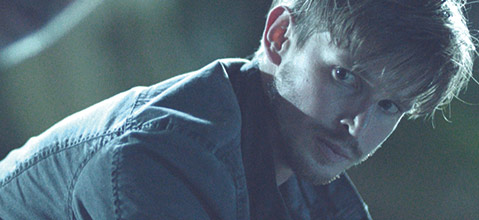‘Lazar’
Director Svetozar Ristovski

Human smuggling of refugees from the Middle East and Africa is a regular business in the Balkan states, where these desperate people can slip from poverty and danger of home into the hope of Western Europe. This compelling feature focuses on one such smuggling outfit in Macedonia, and the attempts of a central player named Lazar to escape the game for a better life.
U.S. PREMIERE
What inspired you to tell this story?
In the early ‘90s, around the same time of the creation of the European Union, the country and the social system that I grew up in collapsed. Macedonia became an independent state, establishing a fragile democracy under a constant threat of inter-ethnic and/or religious conflict, accompanied by the calamity of crime and corruption. The high rate of unemployment made most people feel lost and hopeless. Many of them left, or tried to leave the country, and many of the ones who stayed got involved in some shady business. I witnessed how the system of values changed in just a few years, and the introduction to the rudimentary capitalism, named “a Transition,” turned compassion into weakness, but ruthlessness into strength.
Since Macedonia, and the Balkans in general, are a gateway into the EU, and remained on the other side of the Schengen “wall,” the whole region became a smuggling hub for everything and anything that offered good price in Europe. From cigarettes and drugs, to women and hope.
So, about six years ago, I learned that someone that I knew since childhood, from the town where I grew up, was arrested for smuggling illegal immigrants and was supposed to serve a jail sentence. This spiked my curiosity, and I interviewed the guy, to learn about the criminal network of smuggling people, but I was also very interested into learning more about the psychology of the people involved in it. What I realized is that the most of the smugglers are the most average people one meets every day, went to school with some, worked at the factory with others before they were laid off, or go to church with. Most of them have families. And since they are unemployed, they justify the smuggling as means to their survival, and they don’t see it as a crime at all.
The other even more curious thing is that most of them are much desensitized, that they don’t really see these people as human beings at all, but simply as cargo. The ability to detach from and de-humanize these people, the lack of compassion, or even a conscience, which sounds so inhuman, but unfortunately is so very human — and we all do it, on a various different levels—inspired the story.
Is human smuggling a major business in Macedonia?
I don’t know if I would consider it a major business, but the smuggling of illegal immigrants trying to get into the EU was going on for many years. Until the collapse of the Greek economy, mostly the route was north-to-south, and from a couple of years ago, the route is south-to-north. Also, it involved way more many people than let say smuggling of cigarettes, or drugs. I believe that the penalties were smaller, and ironically, “the cargo” was worth less.
The current Syrian refugee crisis makes this film all the more poignant. Did you see that coming?
While we were filming, the news of smugglers being arrested by the police, or large groups of Middle Easterners trying to get across the borders became quite frequent. That indicated that either the EU was putting stronger pressure on the government to control the border better, or the number of immigrants was increasing. With the “Arab spring” the whole Middle Eastern and North African region became unstable, so one could guess that the number of refugees trying to get into the EU would increase. And of course whenever a civil war breaks out somewhere, and with all the events that are taking place in Syria at present, the number of refugees becomes very dramatic.
Since his father left him as a boy, Lazar is a victim of immigration himself. Was that a theme you intended to explore, how fleeing one’s homeland can hurt on many levels?
Of course. To me, it was important to show that Lazar and his family are affected by the immigration as well, and that they are just one step from the people that they smuggle. It is important that the audience recognize that these people are not very different from the face-less, name-less immigrants that they smuggle. And the immigration is almost like a vicious circle that hangs above the heads of the next generation. We all are on the same boat, and by having no compassion for the less fortunate, we only make the boat a horrible place, and it is our home, and the very likely future of our children.
The acting in the film was amazing. Is there a wealth of Macedonian actors, or were these some of the country’s well-known stars?
I worked with actors from several Balkan countries, Macedonia, Croatia and Bulgaria. Vedran Zivolic (Lazar) is a young Croatian actor, and this is his first major film performance. Natasa Petrovic (Katerina), Dejan Lilic (Toni) and Vlado Jovanovski (Toni’s father) are well known Macedonian actors, and Goran Navojec (Miki) is a Croatian star. I like to mix well established actors with newcomers. It’s a risky combination, and sometimes scary, but it’s also very rewarding.
Is the tension between being Bulgarian and being Macedonian very hostile?
It’s a very complicated love relationship. I think that the people get along very well. However, the shared history, and the nationalism get in the way. I think this is a European problem in general.
What do you hope viewers learn from this film?
Compassion. I hope it will make people think, and start seeing other people as human beings, and not as news and/or numbers.



